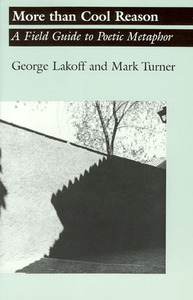You need to sign in or sign up before continuing.
Take a photo of a barcode or cover
Lakoff argues that poetic metaphor is not essentially different from our everyday language or thought processes. And the metaphors in any poem are largely the metaphors of the culture it was composed in, only elaborated, extended, and wielded by an expert. Lakoff analyzes a number of poems and shows how they can be understood only by making use of a great many metaphors so basic and automatic that we barely notice them at all. Great stuff.
I read this, which I sort of didn't know we had a copy of in the house, after I finally committed and bought a copy of _Metaphors We Live By_, to sort of get a sense of what to expect. And I'm not sure what to think.
In places, notably the long second chapter, it's way too inside linguistics for me. I really don't know, and don't altogether care to know, how linguists approach the question of metaphors as a part of language. I mean, I understand why it's important to Lakoff-- but it's not important to me. And throughout the book, there's a level of explication that is a little too detailed-- I mean, I get it already, and the full explanation of what is going on and why was maybe a touch more than I needed at times, as much as again, I get it, that this is supposed to be a thorough primer. But as far as style goes, this book grinds more than it leaps.
That said, there's a lot to like here: as much as the way the writers point away from language to concept is heretical to creative writers, myself included, they make a strong case and get good results from making the leap, and this does allow them to credit writers with doing interesting verbal work with the concepts. The approach to proverbs in the "Great Chain of Being" section is lucid, and some part of me thinks there's a really fun and generative exercise in there, too. So it would be very unfair of me to pretend I got nothing out of this-- a lot of it was really solid. I do wonder what I'll think of the other book, but I really as of now have no immediate plans to dive into that one. Maybe later in the summer.
In places, notably the long second chapter, it's way too inside linguistics for me. I really don't know, and don't altogether care to know, how linguists approach the question of metaphors as a part of language. I mean, I understand why it's important to Lakoff-- but it's not important to me. And throughout the book, there's a level of explication that is a little too detailed-- I mean, I get it already, and the full explanation of what is going on and why was maybe a touch more than I needed at times, as much as again, I get it, that this is supposed to be a thorough primer. But as far as style goes, this book grinds more than it leaps.
That said, there's a lot to like here: as much as the way the writers point away from language to concept is heretical to creative writers, myself included, they make a strong case and get good results from making the leap, and this does allow them to credit writers with doing interesting verbal work with the concepts. The approach to proverbs in the "Great Chain of Being" section is lucid, and some part of me thinks there's a really fun and generative exercise in there, too. So it would be very unfair of me to pretend I got nothing out of this-- a lot of it was really solid. I do wonder what I'll think of the other book, but I really as of now have no immediate plans to dive into that one. Maybe later in the summer.
Delves deeply into metaphor for the sake of its argument but also gives alternate arguments. Large collection of schema. Explanations clear but a little redundant. I love that it includes the political implications of such views. Has been an important book in my studies.
informative
informative
inspiring
slow-paced
challenging
informative
inspiring
slow-paced
The least textbook-feeling textbook I've ever read. Damn cool.
I thoroughly enjoyed this book. I will admit that the explanations sometime bog down a bit. Once you get the method of their analysis you can probably do some of it on your own and thus the repetition gets a tad pedantic. All in all, though, it is an excellent introduction to how our language and thought processes work, showing that metaphor infuses worldviews.
One must be somewhat careful coming to this book with the expectation that it is entirely about poetic metaphor. It is not. In fact, the bookseller categories on the back cover are: Literary Criticism / Linguistics / Cognitive Science.
That said, it does address metaphors in poetry, but its larger task is explaining how metaphor works and arguing for a specific theory of metaphor, based on the Grounding Hypothesis versus most other theories of metaphor based on variations of the Literal Meaning theory.
This book came in handy for my Madwomen Poets class last week as I had just decided to write about Plath’s poem, “You’re,” and I then read the section on global readings of a poem. I was noticing something in the structure itself similar to what I decided the poem was about and this book gave me the language to explicitly state what I intended.
About a fifth of the book is dedicated to the Great Chain metaphor, in both its basic and extended versions. This section is quite interesting and provided me a far better appreciation for the depth and prevalence of this metaphor. One of the more interesting uses of this section is in their explication of proverbs.
I highly recommend this book as an introduction to metaphor. I have previously read both Metaphors We Live By and Women, Fire and Dangerous Things and no doubt they helped me in reading this book. But I honestly think this might be the best one of the three to begin with. Then move on to Metaphors We Live By, and if you are still interested in the research, and cognitive aspects, of metaphor and concepts then have at Women, Fire and Dangerous Things.
Lakoff, George, and Mark Johnson. 1980. Metaphors We Live By. Chicago: University of Chicago Press.
Lakoff, George. 1987. Women, Fire, and Dangerous Things: What Categories Reveal About the Mind. Chicago: University of Chicago Press.
One must be somewhat careful coming to this book with the expectation that it is entirely about poetic metaphor. It is not. In fact, the bookseller categories on the back cover are: Literary Criticism / Linguistics / Cognitive Science.
That said, it does address metaphors in poetry, but its larger task is explaining how metaphor works and arguing for a specific theory of metaphor, based on the Grounding Hypothesis versus most other theories of metaphor based on variations of the Literal Meaning theory.
This book came in handy for my Madwomen Poets class last week as I had just decided to write about Plath’s poem, “You’re,” and I then read the section on global readings of a poem. I was noticing something in the structure itself similar to what I decided the poem was about and this book gave me the language to explicitly state what I intended.
About a fifth of the book is dedicated to the Great Chain metaphor, in both its basic and extended versions. This section is quite interesting and provided me a far better appreciation for the depth and prevalence of this metaphor. One of the more interesting uses of this section is in their explication of proverbs.
I highly recommend this book as an introduction to metaphor. I have previously read both Metaphors We Live By and Women, Fire and Dangerous Things and no doubt they helped me in reading this book. But I honestly think this might be the best one of the three to begin with. Then move on to Metaphors We Live By, and if you are still interested in the research, and cognitive aspects, of metaphor and concepts then have at Women, Fire and Dangerous Things.
Lakoff, George, and Mark Johnson. 1980. Metaphors We Live By. Chicago: University of Chicago Press.
Lakoff, George. 1987. Women, Fire, and Dangerous Things: What Categories Reveal About the Mind. Chicago: University of Chicago Press.
Easy to read, easy to understand, and definitely a huge help for my Stylistics papers!





